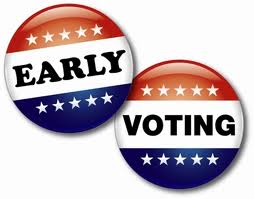Here’s the Chron story on the end of early voting.
Early voting ended Friday with a late surge in turnout among Harris County voters, surpassing voter participation in some prior mayoral election years but falling short of totals seen during the last city election in 2015.
Through 12 days of early voting, more than 152,000 voters cast ballots ahead of the Tuesday election, with about 137,000 voting in person and some 15,000 returning mail ballots. The total represents about 6.5 percent of Harris County’s more than 2.3 million registered voters, far less than the 9.4 percent early voting turnout in 2015 but slightly more than the 5.6 percent turnout in 2013.
Harris County was on track to fall slightly short of 2013 turnout before Friday’s influx of more than 34,000 voters. The final day turnout was roughly double this year’s prior single-day high and accounted for more than one-fifth of overall early voting turnout.
The overall standard turnout rate comes despite a Houston mayoral race that has seen a record $16 million spent between the 12 candidates, according to Rice University political scientist Mark Jones, and several months of vigorous campaigning by Tony Buzbee and Bill King, the top two challengers to Mayor Sylvester Turner.
“For all the money spent, all the bluster, all the hype — that has done nothing to increase turnout,” said Houston Democratic strategist Keir Murray. “We’re seeing a very typical, low-interest municipal election with the great majority of voters being people who always vote.”
[…]
Harris County’s unremarkable turnout reflects the same relatively low voter participation seen in mayoral elections earlier this year in Dallas and San Antonio, Aiyer added. In Bexar County, which includes San Antonio, just 11.5 percent of registered voters turned out for the May election, which included a mayoral contest.
“I think there was a faulty assumption coming off of 2018 that we would have really high turnout,” Aiyer said. “And I think that’s just not borne out by the data at the municipal level statewide.”
The underlying early voting data also show that candidates are drawing few new voters to the polls. Through Thursday, 93 percent of Houston voters in Harris County had participated in at least two of the last three general elections, with 75 percent voting in all three, according to data from the Texas Democratic Party shared by Murray. Just 2 percent did not vote in any of the last three elections.
See here for the final data, and here for Keir’s Saturday Twitter thread on who did the voting. At this point, I think the odds are in favor of betting the under on my 200K to 220K projection for Houston. The 2009 Mayor’s race (178K in Harris County) and 2013 Mayor’s race (174K in Harris County) are looking like better comps. It’s possible that Election Day turnout will be higher than expected – the four-year cycle may be altering previous patterns, and the Astros’ playoff run may have distracted people – but probably not. I’ll run through some scenarios tomorrow and come up with concrete numbers to throw around.
In the meantime, the new college campus EV locations got positive reviews.
The University of Houston’s Student Center was bustling over the weekend with pre-Halloween festivities, at least one lively pep rally, sorority and fraternity events, and, for the first time, early voting.
“It’s been a fair turnout, and people who have voted are very appreciative that the voting is happening here,” Bruce Davis, an alternative election judge for Harris County, said Monday.
Numbers at UH’s polling station — like those at two other new early-voting locations in the county — were modest, and Davis said there were still kinks to be worked out.
This year, the Harris County Clerk’s Office introduced three new early polling locations — at UH, Texas Southern University and Houston Community College’s West Loop campus — in hopes of reaching at least 50,000 more voters, mostly students, according to Michael Winn, administrator of elections for the Harris County Clerk’s office, which oversees elections. The target includes 40,000 new voters at UH alone. The office is now led by Democrat Diane Trautman, who unseated Republican incumbent Stan Stanart last year and has backed countywide election centers to encourage higher turnout.
As of Wednesday evening, the early-voting totals were 750 at UH, 452 at TSU and 796 at HCC’s West Loop campus. But officials were not worried. According to Winn, it’s all a part of the process as people adjust to their new polling locations. In the meantime, officials are keeping a watchful eye ahead of next year’s primary and presidential elections.
“We just want to begin to lay the foundation for those locations to already be in place so people will be accustomed to going to those locations and utilizing the facilities,” Winn said.
In the end, the HCC location got 1,262 early votes, UH got 1,125, and TSU got 750. It’s a decent start for brand new locations. I agree that 2020 is both the priority and the bigger test.


Those candidates that spent and modeled their campaigns on a huge turnout are probably done , yet the campaigns that limited funding to the normal voting populous probably have an unexpected fighting chance 2 runoff.